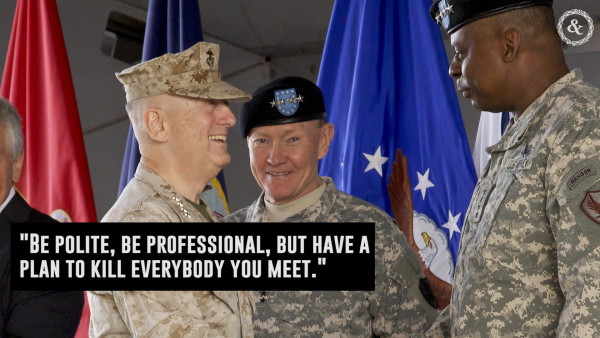

President Donald Trump just can’t stop telling stories about former Defense Secretary James Mattis. This time, the president claims Mattis said U.S. troops were so perilously low on ammunition that it would be better to hold off launching a military operation.
“You know, when I came here, three years ago almost, Gen. Mattis told me, ‘Sir, we’re very low on ammunition,'” Trump recalled on Monday at the White House. “I said, ‘That’s a horrible thing to say.’ I’m not blaming him. I’m not blaming anybody. But that’s what he told me because we were in a position with a certain country, I won’t say which one; we may have had conflict. And he said to me: ‘Sir, if you could, delay it because we’re very low on ammunition.’
“And I said: You know what, general, I never want to hear that again from another general,” Trump continued. “No president should ever, ever hear that statement: ‘We’re low on ammunition.'”
Mattis declined to respond to the president’s comments on Monday. Since he resigned in protest last year over Trump’s initial decision to withdraw all U.S. troops from Syria, Mattis has steadfastly avoided criticizing the president, citing the French concept of devoir de reserve – the duty of silence.
Trump puts words in Mattis's mouth, says that when he took office, Mattis told him, "'Sir, we're very low on ammunition' … and I said, you know what? General, I never want to hear that again from another general. Not president should ever, ever hear that statement." pic.twitter.com/u8kSSqT9bb
— Aaron Rupar (@atrupar) September 16, 2019
No information was immediately available about when Mattis’ conversation with Trump allegedly took place or what country the president was referring to. Trump’s comments on Monday were just the latest personal attack on Mattis, who is widely revered by service members — especially Marines, who consider him a man-god.
When Mattis submitted his resignation in December, Trump was initially respectful, tweeting that Mattis would retire in February. But as media reports focused on Mattis’ differences with the president, which he subtly expressed in his resignation letter, Trump became enraged and announced Mattis would leave the Pentagon on Jan. 1.
The president subsequently falsely claimed that he had fired Mattis because the U.S. military had not made adequate progress in Afghanistan.
“As you know, President Obama fired him, and essentially so did I,” Trump said during his Jan. 2 cabinet meeting. “I want results.”
The following month, Trump told the New York Times that Mattis had not submitted his resignation letter voluntarily.
“That’s why in the letter he wrote, ‘You have to have your own choice,'” Trump said in his Feb. 1 interview. “The reason he said that was because I said, ‘You’re just not my choice.'”
Ahead of the release of his book “Call Sign Chaos: Learning to Lead,” Mattis wrote an essay in the Wall Street Journal last month about how he used the skills he had honed as a Marine to serve as defense secretary “for as long as I could.”
“When my concrete solutions and strategic advice, especially keeping faith with our allies, no longer resonated, it was time to resign, despite the limitless joy I felt serving alongside our troops in defense of our Constitution,” Mattis wrote.
